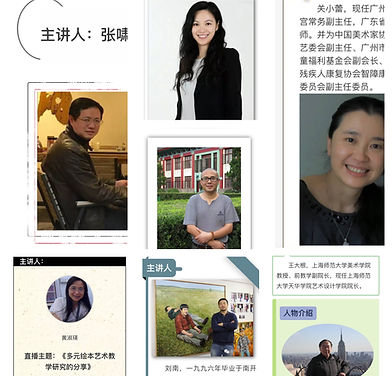
HIGHLIGHTS 花絮
LOOKING BACK
WCAEA at InSEA 2019
The University of British Columbia, Vancouver, BC Canada
July 9 - 13, 2019


Moving Forward and Coming Together: A World Chinese Arts Education Association Experience
THE EDUCATION UNIVERSITY OF HONG KONG HOSTED THE 7TH WCAEA SYMPOSIUM
DECEMBER 8 - 10, 2018
InSEA Asia Regional Congress, Hong Kong, 2018 & The 7th World Chinese Art Education Symposium InSEA Asia Regional Congress, Hong Kong


NINGBO UNIVERSITY HOSTED THE 6TH WORLD CHINESE ART EDUCATION SYMPOSIUM in 2017
NOVEMBER 18-20, 2017, NINGBO UNIVERSITY, CHINA
Theme: " Reflection and Responsibility: The Present and Future of Visual Art Education"

The symposium includes activities such as keynote lectures, panels, graduate student forums, master workshops, children's art exhibitions, and open classrooms. All attendees will have opportunities to engage in discussions, gain new perspectives, and reflect on current issues in arts education. This conference is endorsed by the International Society of Education Through Arts (InSEA).
2015 5TH WCAEA SYMPOSIUM , SHANGHAI
EAST CHINA NORMAL UNIVERSITY
NOVEMBER 15 TO 17, 2015


POST CONFERENCE WITH INVITED SPEAKER DR. TOM ANDERSON
2013 4TH WCAEA SYMPOSIUM, GUANGZHOU
GUANGZHOU ACADEMY OF FINE ARTS
NOVEMBER 16-18, 2013
THEME:
Synthesis, Interaction, Innovation

4TH WCAEA SYMPOSIUM
MASTER WORKSHOP WITH DR. MICHAEL PARSONS
TITLE: INTERPRETING CONTEMPORARY ARTWORKS

This workshop is about the principles of interpreting contemporary artworks/visual images and of teaching them in schools. It focused mostly on interpreting works from other cultures and was interactive in nature. We compared two educational approaches to the discussion of visual images. The older one was called “criticism” and it divided criticism into four stages. The last stage was the “evaluation” of the work discussed. A more contemporary approach is called “interpretation” and focuses on meaning, rather than evaluation.

4TH WCAEA SYMPOSIUM
MASTER WORKSHOP WITH DR. ENID ZIMMERMAN & DR. YICHIEN COOPER
TITLE: UNDERSTANDING CONCEPTUAL FRAMEWORKS FOR ART EDUCATION RESEARCH AND PRACTICE
Conceptual frameworks are used in research studies to set forth interconnections among concepts presented in a significant body of inquiry. Conceptual frameworks can take form graphically as maps or diagrams and as written narratives focusing on interrelated concepts based on existing systems or relationships embedded in well-established theories. A conceptual framework, as integral part of any research design, usually is established before an inquiry commences and supports and informs a study under consideration. It is constructed by a researcher from existing bodies of inquiry that enable finding links between associated literature and an inquirer’s own research goals. Once a study is complete then a conceptual framework can be consulted as to whether an inquiry aggress with, disagrees with, or adds new connections among the concepts found in the originating conceptual framework. As a result of their studio art backgrounds, their abilities to render ideas visually, and their participation in contemporary visual culture, art education researchers and practitioners are unique positions to create graphic, conceptual frameworks along with traditional written explanations. In this workshop, observations about the use of conceptual frameworks in art education research will be introduced, exemplars from art education research studies will be presented, and participants will be engaged in discussion and activities about understanding these frameworks. The concluding activity in the workshop will involve participants breaking into small groups and creating a conceptual framework from the same literature abstract that, when completed, will be contrasted and compared across groups.
MASTER CLASS WITH DR. BERNARD DARRAS
TITLE: " DRAWING AT SCHOOL: ART OR COMMUNICATION?"

This workshop is specifically designed for teachers who are concerned by children's drawing skills and practices development. Based on graphic experiments and case studies, we will examine the bases of graphic communication and its evolution through the process of learning; especially how they have evolved simultaneously as a human means of communication, a technique to express visual thinking, but also as tools for research, creativity, and cooperation.This functional and communicative approach will be confronted to the typical goals of arts education in the aesthetic, the practices, and the Art knowledge fields. Through discussions and debates, participants will explore the constraints and paradoxes of the goals of art education curriculum and formulate possible solutions.

MASTER CLASS WITH DR. PAT VILLENEUVE
TITLE: MUSEUM LABEL WRITING AS AN EXAMPLE OF CONSTRUCTIVIST TEACHING
This master class welcomes students and faculty who are interested in constructivist teaching or art museum practice (or both). Constructivism is a modern epistemology, or set of ideas about how people learn, that holds that individuals construct their own knowledge based on their prior knowledge and experiences. The presenter will briefly discuss constructivist ideas and juxtapose them with a traditional view of knowledge transmission from the teacher to the student. To model constructivist teaching, the presenter will share a label-writing activity from her museum education class. Participants will then have an opportunity to try the label-writing activity or consider how they might incorporate constructivist techniques in their teaching. Participants should expect to be actively engaged in this master class. The atmosphere will be informal, and there will be discussion, questioning, and reflection, rather than lecturing.












